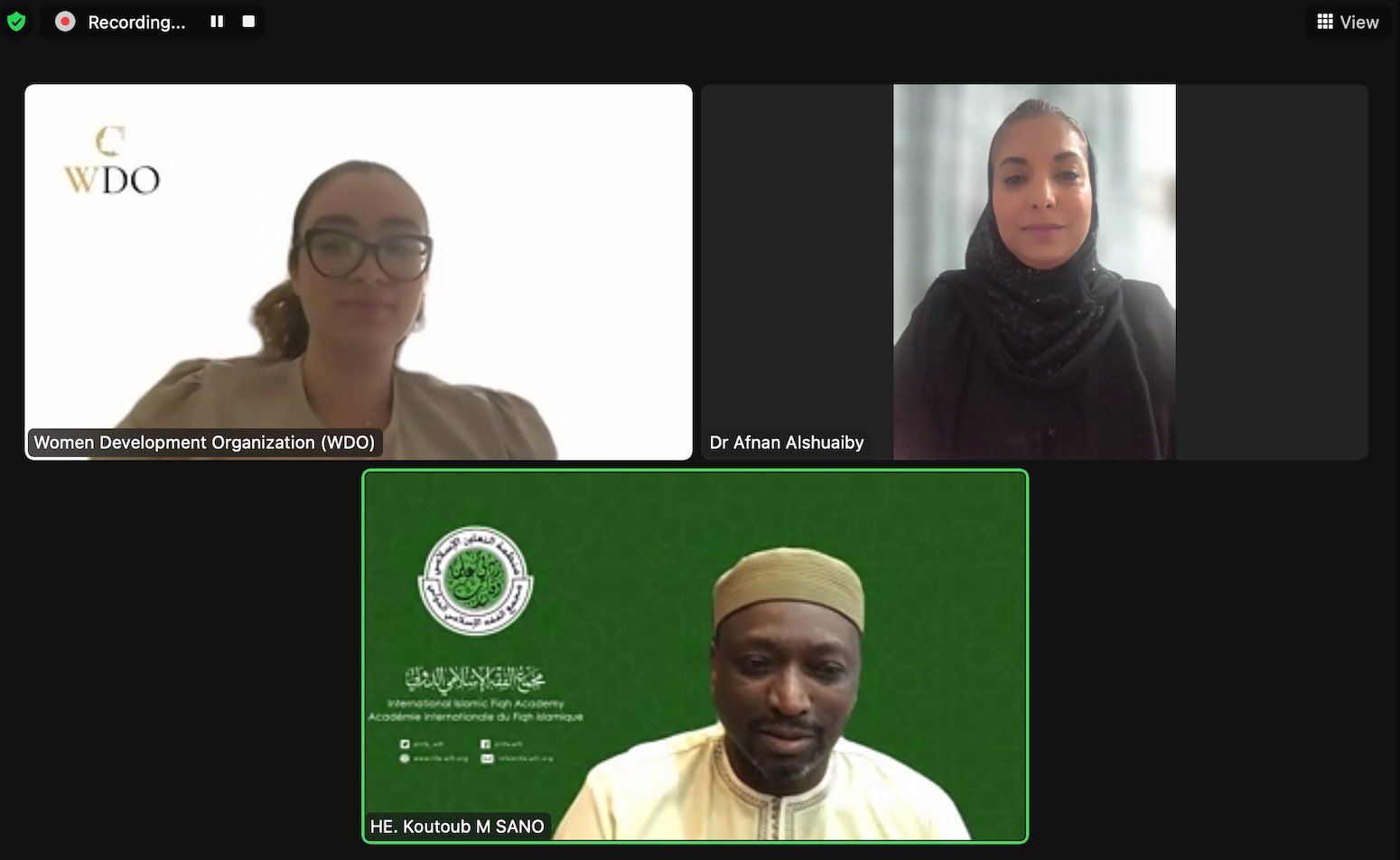
H.E. Prof. Koutoub Moustapha Sano, Secretary General of the International Islamic Fiqh Academy, participated with H.E. Dr. Afnan Al-Shuaibi, Executive Director of the Women’s Development Organization (WDO), on Wednesday, 26th Rabi’ al-Awal 1445, corresponding to 11 October 2023, in the final session of WDO’s online seminar series, entitled “Islam and Wrong Social Customs”.
At the beginning of his intervention, His Excellency congratulated the Executive WDO Director and her team for the organization of this successful series, as it is a means of enlightenment, education, and correction of many women’s issues and Islam’s clear and firm position on those issues, far from the inverted or mistaken understandings that are often attributed to Islam. His Excellency emphasized that many of these concepts and practices that attack women’s dignity, confiscate their rights, and attempt to exclude them from life have absolutely nothing to do with Islam, pointing out that Islam gives women the right to full financial independence by enabling them to control and dispose of their money in the way they want without guardianship, or authority from someone, and therefore, any understanding or practice that affects this right, and attempts to undermine it, that understanding, and practice has nothing to do with Islam. His Excellency stressed that there is no difference in Islam between men and women regarding the issue of financial independence, as they both have the absolute right to dispose of their money by managing it in the way each of them wants. He also stressed that women’s work in Islam for the sake of earning and gaining is not only permitted, but she is commanded to do it just like her male counterpart, because work in Islam is a form of worship, and both men and women are commanded to worship equally.
His Excellency clarified that the Quran and the Sunnah that were mentioned in urging work never differentiated between a man and a woman, and among those texts is the Almighty’s saying “Whoever does righteousness, whether male or female, while he is a believer – We will surely cause him to live a good life, and We will surely give them their reward [in the Hereafter] according to the best of what they used to do.”An-Nahl: 97, and “And say, “Do [as you will], for Allah will see your deeds, and [so, will] His Messenger and the believers. And you will be returned to the Knower of the unseen and the witnessed, and He will inform you of what you used to do.” Al-Tawbah: 105 and “And for all, We have made heirs to what is left by parents and relatives. And to those whom your oaths have bound [to you] – give them their share. Indeed, Allah is ever, over all things, a Witness.” An-Nisa: 32.
These sacred texts are clear in declaring a woman’s right to own and dispose of her money just like her male counterpart. Therefore, differentiating between them is considered a blatant violation of Sharia. These texts also clearly state that only women have the right to decide what they will do with their money.
The session discussed a number of societal ideas that have led and continue to lead to compromising women established financial rights in Islam. It also discussed the importance of working for equal work and employment opportunities for women to enable them to own and own property, as well as the challenges facing women’s financial independence in this age.
His Excellency concluded with a careful analysis of the issue of inheritance in Islam, and the confusion that arises around it regarding the disparity in shares between males and females, noting that the basis of inheritance in Islam is justice and not equality as many people think, and there is a difference between justice and equality, because justice requires giving each of the heirs what he deserves from the estate and what he needs based on the responsibilities and duties assigned to him towards the family members. This is not considered a preference, but rather considering the circumstances of each heir. As long as the male is obligated in Islam to spend on his sister and support her if she needs that, then whatever share he is given is given in exchange for this responsibility that falls on him alone and not his sister. Therefore, there is no differentiation or superiority, but rather justice and preservation of the bonds of cooperation, support and solidarity between members of the same family.
The meeting concluded with participants asking questions and the guests answering them. It is worth noting that WDO’s series of online seminars was successful and witnessed great reception, and therefore, the WDO decided to upload it to their website and YouTube channel.
Read Also
Lastest








